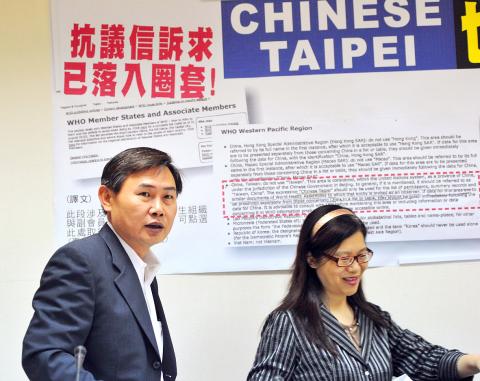The WHO has not wavered on its position that Taiwan is a part of China despite extending an invitation to the Department of Health under the designation “Chinese Taipei,” new information from the WHO reveals.
The stance, already evident from a leaked internal WHO memo released by Democratic Progressive Party (DPP) Legislator Kuan Bi-ling (管碧玲) last week, was strengthened by the new disclosure yesterday of the organization’s internal publishing policies that state Taiwan is “a province of China.”
“This area is considered, within the United Nations system, as a province of China under the jurisdiction of the Chinese government in Beijing,” the memo says, expressly forbidding WHO staff from simply using the term “Taiwan.”

Photo: CNA
The words “Chinese Taipei” should only be used for “a list of participants, summary records and similar documents of World Health Assemblies to which that entity is invited as an observer.”
Kuan said the information was further evidence that Taiwan’s breakthrough in attending the World Health Assembly (WHA) for the third year running has come at a hefty price.
Meant for WHO staff, the information is part of an internal Web site that informs officials on the “WHO house style” as part of the organization’s publishing policies. The Web page, which directs questions to the WHO’s legal team, was leaked by a source within the WHO, Kuan said.
The page was last updated on Feb. 23 this year, five months after senior WHO officials sent out a confidential memo asking agencies to be expressly aware that Taiwan is a “province of China,” pursuant to a prior closed-door arrangement with Beijing, Kuan said.
“The WHO controversy shows that Taiwan’s legal status is being eroded even as the governing party continues to mislead the [public] by playing games with our name,” Kuan said. “Taiwan’s sovereignty is being sold out — that’s an unavoidable and undeniable fact.”
Taiwan’s delegation to the WHA has formally protested about being lumped together with China, writing to WHO Secretary-General Margaret Chan (陳馮富珍) on Monday that its internal designation of “Taiwan, China” is a “mistake” and “absolutely unacceptable.”
The DPP labeled the protest “weak,” arguing that the controversy seriously undermines the nation’s international standing.
Chinese Taipei — Taiwan’s designation in most international organizations, including at the Olympic Games — has never before been seen as part of China, as the WHO information made clear, DPP lawmakers said.
The lawmakers have called for a boycott of the meeting that opened on Monday.
“Without adequately expressing our protest, I don’t feel that there is a way that Taiwan can attend the WHA,” DPP Legislator Lee Chun-yee (李俊毅) said. “What that would show is that we have completely given up on Taiwan’s sovereignty.”
Chinese Nationalist Party (KMT) lawmakers have called the DPP’s remarks “election rhetoric,” pointing out that the government has to keep in mind long-term interests when protesting the memo.
“I don’t think that getting angry is what the public expects the government to do,” KMT Legislator Lin Yi-shih (林益世) said. “Everybody must work together to think of ways to make this country better, instead of continuing with election ploys.”

Right-wing political scientist Laura Fernandez on Sunday won Costa Rica’s presidential election by a landslide, after promising to crack down on rising violence linked to the cocaine trade. Fernandez’s nearest rival, economist Alvaro Ramos, conceded defeat as results showed the ruling party far exceeding the threshold of 40 percent needed to avoid a runoff. With 94 percent of polling stations counted, the political heir of outgoing Costa Rican President Rodrigo Chaves had captured 48.3 percent of the vote compared with Ramos’ 33.4 percent, the Supreme Electoral Tribunal said. As soon as the first results were announced, members of Fernandez’s Sovereign People’s Party

MORE RESPONSIBILITY: Draftees would be expected to fight alongside professional soldiers, likely requiring the transformation of some training brigades into combat units The armed forces are to start incorporating new conscripts into combined arms brigades this year to enhance combat readiness, the Executive Yuan’s latest policy report said. The new policy would affect Taiwanese men entering the military for their compulsory service, which was extended to one year under reforms by then-president Tsai Ing-wen (蔡英文) in 2022. The conscripts would be trained to operate machine guns, uncrewed aerial vehicles, anti-tank guided missile launchers and Stinger air defense systems, the report said, adding that the basic training would be lengthened to eight weeks. After basic training, conscripts would be sorted into infantry battalions that would take

GROWING AMBITIONS: The scale and tempo of the operations show that the Strait has become the core theater for China to expand its security interests, the report said Chinese military aircraft incursions around Taiwan have surged nearly 15-fold over the past five years, according to a report released yesterday by the Democratic Progressive Party’s (DPP) Department of China Affairs. Sorties in the Taiwan Strait were previously irregular, totaling 380 in 2020, but have since evolved into routine operations, the report showed. “This demonstrates that the Taiwan Strait has become both the starting point and testing ground for Beijing’s expansionist ambitions,” it said. Driven by military expansionism, China is systematically pursuing actions aimed at altering the regional “status quo,” the department said, adding that Taiwan represents the most critical link in China’s

EMERGING FIELDS: The Chinese president said that the two countries would explore cooperation in green technology, the digital economy and artificial intelligence Chinese President Xi Jinping (習近平) yesterday called for an “equal and orderly multipolar world” in the face of “unilateral bullying,” in an apparent jab at the US. Xi was speaking during talks in Beijing with Uruguayan President Yamandu Orsi, the first South American leader to visit China since US special forces captured then-Venezuelan president Nicolas Maduro last month — an operation that Beijing condemned as a violation of sovereignty. Orsi follows a slew of leaders to have visited China seeking to boost ties with the world’s second-largest economy to hedge against US President Donald Trump’s increasingly unpredictable administration. “The international situation is fraught